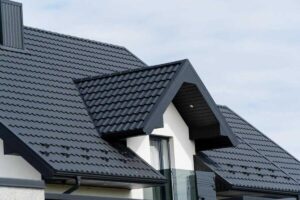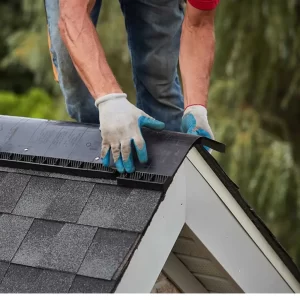How a New Roof Can Increase Your Home’s Value
A home is one of the most significant investments a person can make, and maintaining or increasing its value is always a priority for homeowners. While many people focus on renovations such as kitchen remodels or bathroom upgrades, one of the most impactful ways to enhance a home’s value is by installing a new roof. A roof serves as a protective barrier against the elements, but it also plays a crucial role in aesthetics, energy efficiency, and overall property worth. Understanding how a new roof contributes to home value can help homeowners make informed decisions about their property investments.
Enhancing Curb Appeal
 The exterior of a home is the first thing people notice, and a well-maintained roof can significantly boost curb appeal. A roof that appears worn-out, stained, or damaged can make a house look aged and uninviting. On the other hand, a brand-new roof gives a home a fresh, updated look, making it more attractive to potential buyers. Homebuyers are more likely to be drawn to a property that requires minimal maintenance, and a new roof signals that the house is in good condition.
The exterior of a home is the first thing people notice, and a well-maintained roof can significantly boost curb appeal. A roof that appears worn-out, stained, or damaged can make a house look aged and uninviting. On the other hand, a brand-new roof gives a home a fresh, updated look, making it more attractive to potential buyers. Homebuyers are more likely to be drawn to a property that requires minimal maintenance, and a new roof signals that the house is in good condition.
Beyond aesthetics, different roofing materials can further enhance curb appeal. Homeowners have a variety of options, from traditional asphalt shingles to modern metal or eco-friendly materials. Choosing the right style and color can complement the home’s architecture and improve its overall appearance, making it stand out in the neighborhood.
Improving Energy Efficiency
A new roof can contribute to better energy efficiency, which is an important factor for homeowners and buyers alike. Older roofs often lack proper insulation or may have ventilation issues that cause heat loss in the winter and excessive heat buildup in the summer. These problems lead to higher energy costs as heating and cooling systems work harder to maintain indoor temperatures.
Modern roofing materials are designed to improve energy efficiency by reflecting sunlight and providing better insulation. Options such as cool roofs, which use reflective coatings or lighter-colored shingles, help reduce heat absorption and lower cooling costs. Additionally, new roofing systems often come with improved ventilation features that regulate airflow, keeping a home more comfortable throughout the year. An energy-efficient roof can be a major selling point, as buyers are increasingly looking for homes that offer lower utility bills and reduced environmental impact.
Increasing Structural Integrity and Safety
A deteriorating roof can pose significant risks to a home’s structural integrity. Leaks, missing shingles, and weakened materials can allow moisture to seep into the house, leading to mold growth, wood rot, and even structural damage. Over time, these issues can become costly to repair and may reduce the overall value of the home.
Installing a new roof provides homeowners with peace of mind, knowing that their home is protected against water damage, strong winds, and other environmental factors. Many modern roofing materials are designed to withstand extreme weather conditions, offering greater durability and longevity. Buyers are more likely to invest in a property that has a strong, secure roof, as it eliminates concerns about future repairs or hidden damage.
Adding Marketability and Faster Sales
 When selling a home, the condition of the roof can significantly impact marketability. Buyers often prefer properties that require minimal immediate maintenance, and a new roof can be a major selling point. It reassures buyers that they will not have to deal with expensive roofing repairs in the near future, making the home more appealing.
When selling a home, the condition of the roof can significantly impact marketability. Buyers often prefer properties that require minimal immediate maintenance, and a new roof can be a major selling point. It reassures buyers that they will not have to deal with expensive roofing repairs in the near future, making the home more appealing.
Real estate agents often highlight new roofs as a key feature in property listings, attracting more potential buyers. Homes with recently replaced roofs tend to sell faster and sometimes even at a higher price compared to those with older or damaged roofs. The investment in a new roof can pay off in the form of increased buyer interest and a smoother selling process.
Maximizing Return on Investment
While installing a new roof is a significant expense, it is often a worthwhile investment. The return on investment (ROI) for a new roof varies based on factors such as location, roofing material, and overall market conditions. However, studies have shown that homeowners can typically recoup a large percentage of their roofing costs when selling their home.
In addition to direct financial returns, a new roof also adds long-term value by reducing maintenance expenses and improving energy efficiency. Even if homeowners are not planning to sell immediately, having a durable and attractive roof can contribute to long-term savings and an enhanced living experience.
Leave a Reply